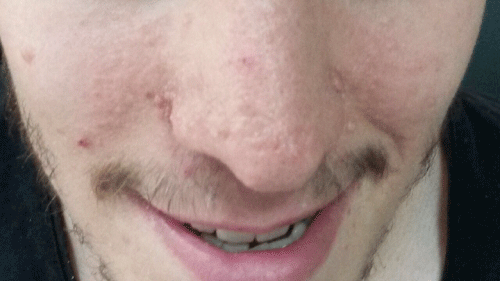
Case Report
Austin J Clin Neurol 2015;2(1): 1018.
Tuberous Sclerosis and Substance Abuse: A Case Report
Maner F*, Özdemir M, Çetinkaya O and Ipekçioğlu D
Bakirkoy Research and Training Hospital for Psychiatry, Neurology and Neurosurgery, Turkey
*Corresponding author: Maner F, Bakirkoy Research and Training Hospital for Psychiatry, Neurology and Neurosurgery, Istanbul, Turkey
Received: January 04, 2015; Accepted: January 30, 2015; Published: February 16, 2015
Abstract
Tuberous sclerosis complex is a neurocutaneous disorder with significant neuropsychological implications, especially with regards to epilepsy and cognition and characterized by a wide phenotypic spectrum, occurring in approximately 1 in 6000 to 10,000 individuals. The diagnosis of tuberous sclerosis complex is based on the lesions found on clinical examination, imaging, and pathological studies. Clinical manifestations are present according to organ systems. The type, size, number, and sometimes the location of involved lesions and organ systems indicate the clinical presentations. Clinicians must take in consideration the management of the clinical features of the disease and understanding of the pathogenesis and pathophysiology.
Here we report a case of tuberous sclerosis complex with involvement of skin, eye, heart, kidney, and brain. Intellectual disability and impulsivity, complicated with epilepsy history and substance abuse that increases criminal tendencies are the significant aspects of the case that should be discussed.
Introduction
Tuberous sclerosis is a multi-system-genetic disease characterised by intellectual disability, seizures and hamartomatous lesions in many organs such as brain, skin, eyes, heart, lungs, and kidney [1-5]. Infantil spasms are most frequently seen among epileptic seizures [6- 8]. Psychiatric comorbidity especially aggressive/disruptive behavior disorder is very common in tuberous sclerosis [9-11].
Our case is tuberous sclerosis with involvement of skin, eye, heart, kidney, and brain. Psychiatric aspects of intellectual disability and impulsivity are in the foreground and complicated with epilepsy history and substance abuse that increases criminal tendencies.
Case Presentation
A 20-years-old male whose symptoms reported by his parents to be associated with substance abuse such as cannabis, heroin and bonsai include increased oppositional behaviours, agitation, irritability, physical aggression, and molestation for two months. Before three years, he was hospitalized in child and adolescent psychiatry inpatient clinic with diagnosis of Mild Intellectual Disability and Epilepsy and disability report sixty percent. He has not used any regular drug after discharge.
On physical examination, adenoma sebaceum was observed on his face (Figure 1). At psychiatric assessment, it was observed that his self-care was poor. His psychomotor activity was increased. He was conscious, cooperating and oriented. He had an irritable mood and dysphoric affect with inappropriate laughing. His thought content was poor and he did not describe any delusions or illusions. He reported auditory hallucination giving order. He had no insight about his problems. His vital signs were normal. Results of blood work, including complete blood count, electrolytes, microbiological tests including HIV, HBV, HCV antibodies as well as hepatic and renal function tests were normal. Tomography and magnetic resonance imaging of the brain indicated tuberous lesions (Figure 2). Echocardiography was revealed bicuspid aortic and moderate aortic valve insufficiency. Two hamartomatous lesions are observed in fundus examination. In urine ultrasonography there was a lesion related with angiomyolipoma in right kidney.

Figure 1: Adenoma sebaceum on the face.

Figure 2: Tomography and magnetic resonance imaging of the brain
indicated tuberous lesions.
The case was diagnosed substance abuse and mild intellectual disability according to DSM-5 diagnostic criteria and haloperidol (10 mg/d) biperiden (4 mg/d) and topiramate (100 mg/d) PO was started as treatment. After a week haloperidol was changed with olanzapine (20 mg/d) PO due to extra pyramidal side effects like perioral tremor.
Discussion
This case includes excessively risky behavior such as intellectual disability and impulsivity that may facilitate use of substance and encouraging crime such as molestation/abuse individuals. The patients may be prone to interpersonal sensitivity and social alienation due to the deficits of the disorder. Psychiatric comorbidities are directly proportional with multi-organ involvement [12,13].
Conclusion
Tuberosclerosis is a neurocutaneous disorder and associated with neurological and psychiatric conditions. Multidisciplinary clinical approach is crucial for patients and their families.
References
- Lewis JC, Thomas HV, Murphy KC, Sampson JR. Genotype and psychological phenotype in tuberous sclerosis. J Med Genet. 2004; 41: 203-207.
- Winterkorn EB, Pulsifer MB, Thiele EA. Cognitive prognosis of patients with tuberous sclerosis complex. Neurology. 2007; 68: 62-64.
- Muzykewicz DA, Newberry P, Danforth N, Halpern EF, Thiele EA. Psychiatric comorbid conditions in a clinic population of 241 patients with tuberous sclerosis complex. Epilepsy Behav. 2007; 11: 506-513.
- DiMario FJ Jr. Brain abnormalities in tuberous sclerosis complex. J Child Neurol. 2004; 19: 650-657.
- Chung TK, Lynch ER, Fiser CJ, Nelson DA, Agricola K, Tudor C, et al. Psychiatric comorbidity and treatment response in patients with tuberous sclerosis complex. Ann Clin Psychiatry. 2011; 23: 263-269.
- Joinson C, O'Callaghan FJ, Osborne JP, Martyn C, Harris T, Bolton PF. Learning disability and epilepsy in an epidemiological sample of individuals with tuberous sclerosis complex. Psychol Med. 2003; 33: 335-344.
- Kopp CM, Muzykewicz DA, Staley BA, Thiele EA, Pulsifer MB. Behavior problems in children with tuberous sclerosis complex and parental stress. Epilepsy Behav. 2008; 13: 505-510.
- Zaroff CM, Isaacs K. Neurocutaneous syndromes: behavioral features. Epilepsy Behav. 2005; 7: 133-142.
- Krueger DA, Franz DN. Current management of tuberous sclerosis complex. Paediatr Drugs. 2008; 10: 299-313.
- Raznahan A, Joinson C, O'Callaghan F, Osborne JP, Bolton PF. Psychopathology in tuberous sclerosis: an overview and findings in a population-based sample of adults with tuberous sclerosis. J Intellect Disabil Res. 2006; 50: 561-569.
- Staley BA, Montenegro MA, Major P, Muzykewicz DA, Halpern EF, Kopp CM, et al. Self-injurious behavior and tuberous sclerosis complex: frequency and possible associations in a population of 257 patients. Epilepsy Behav. 2008; 13: 650-653.
- Pulsifer MB, Winterkorn EB, Thiele EA. Psychological profile of adults with tuberous sclerosis complex. Epilepsy Behav. 2007; 10: 402-406.
- Prather P, de Vries PJ. Behavioral and cognitive aspects of tuberous sclerosis complex. J Child Neurol. 2004; 19: 666-674.